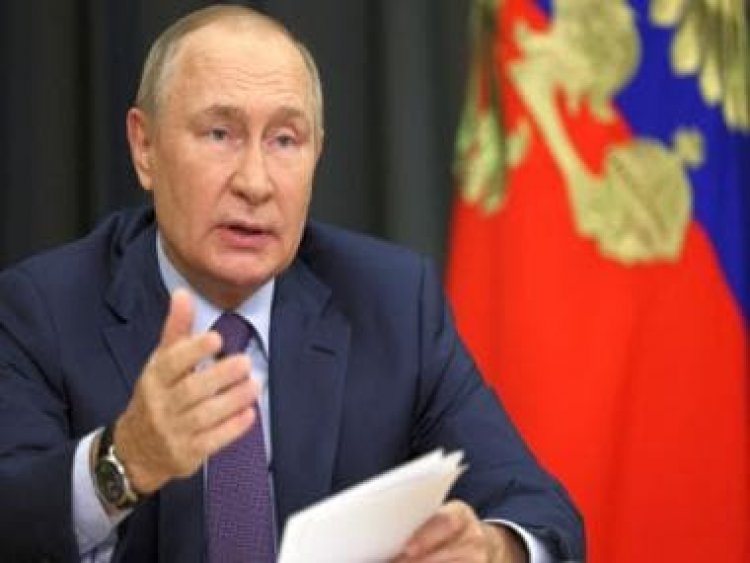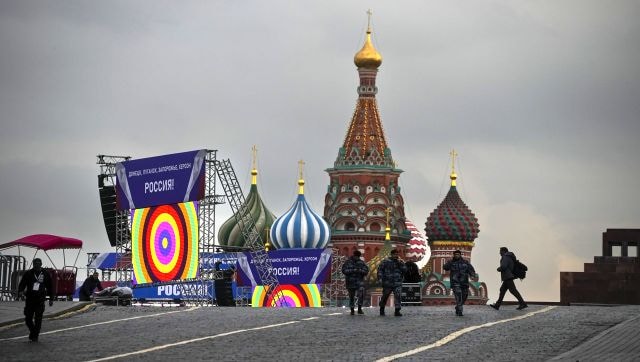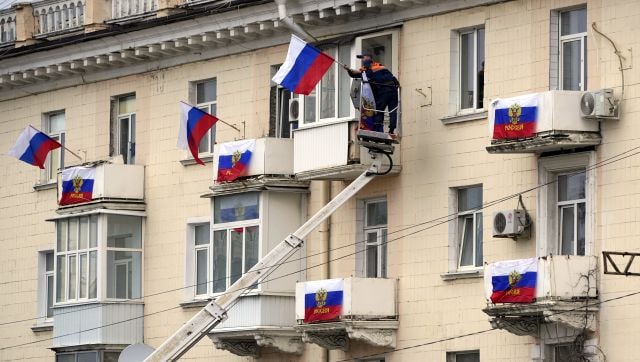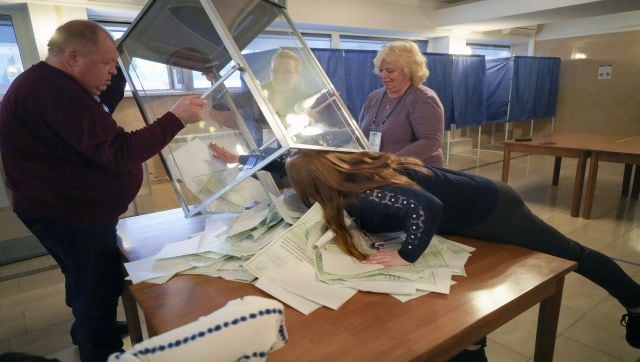Explained: How Putin’s formal annexation of 15% of Ukraine will change the war
Explained: How Putin’s formal annexation of 15% of Ukraine will change the war

In a grand ceremony led by President Vladimir Putin, Russia annexed four regions of Ukraine, after results of the referendums showed overwhelming support in four provinces for joining Russia.
On Moscow’s Red Square, a stage with giant video screens has been set up, with billboards proclaiming “Donetsk, Luhansk, Zaporizhzhia, Kherson – Russia!”
According to Putin’s spokesman Dmitry Peskov, the ceremony took place at 5.30 pm IST in Kremlin’s St. George’s Hall. Putin delivered a speech and met with Russian-backed leaders of the four occupied regions on the sidelines of the ceremony.
What does annexation mean? What does this mean for the Russia-Ukraine war? What happens next? Confused about the whole thing? We dissect the entire matter and provide you with a dummies guide to the events unfolding.
What happens next?
With the formal announcement of the four regions — Kherson, Zaporizhzhia, Donetsk and Luhansk — Russia is now in control of 15 per cent of Ukraine’s territory.
#UPDATE Moscow will formally annex four Russia-occupied regions of Ukraine at a Kremlin ceremony on Friday, President Vladimir Putin’s spokesman said Thursday.
Map shows areas where votes on becoming part of Russia were organised by Moscow, September 23-27#AFPGraphics @AFP pic.twitter.com/zZs17gnLgL
— AFP News Agency (@AFP) September 29, 2022
In addition to occupying more land, Vladimir Putin now now have a larger pool of people to draft into the military. With these regions joining Russia, they are eligible to be drafted to fight for Russia against Ukraine.
There are also tactical benefits to annexing Ukrainian territory. After failing to achieve his ambitions of taking over Kyiv and removing the government led by President Volodymyr Zelenskyy, Putin’s move of annexation will help him shore up his power and cement his control over regions.
Roger Moorhouse, a British historian specialising in German and Central European history, told Time magazine, “What we’re seeing is an attempt to freeze the front line at this point.” He explained that by doing this before winter sets in could allow Putin to reorganise and revitalise his war efforts in preparation for spring.

Another benefit that Putin earns through the annexation is that he can now sell the idea of mobilisation and conscription to the masses. Conscripting hundreds of thousands of people into the Russian forces at the time when the country was facing losses on the field to the Ukrainians, was going to be a hard sell for the Russian leader.
But by annexing Ukrainian territory, Putin has given a further justification for the mobilisation. Putin may also hope that the move will boost support for the war both domestically and among Russia’s international allies, such as China.
However, the most significant aspect of Putin’s annexation of the Ukrainian territory is that it may undermine the West’s support for Ukraine. Even though the United States, United Kingdom and others have expressed their continued support — militarily and financially — there are concerns about the escalation of the war. It also forces the West to rethink if they really have the stomach to continue the war and at what cost.
As Moorhouse tells Time, “It’s an exercise in intimidating the Western alliance, to test its mettle.”
How has the West reacted?
The West and Ukraine have decried the referendums as “shams” and said they won’t accept the results.
United Nations Secretary-General Antonio Guterres said the annexation marks ‘dangerous escalation’. Speaking to reporters ahead of today’s ceremony, the UN chief said, “Any decision to proceed with the annexation of Donetsk, Luhansk, Kherson and Zaporizhzhia regions of Ukraine would have no legal value and deserves to be condemned.
“If Russia moves ahead with its plans to annex four Ukrainian regions, it would prolong the dramatic impacts on the global economy, especially in developing countries, and hinder our ability to deliver life-saving aid across Ukraine and beyond.”

Ukraine’s Volodymyr Zelenskyy also slammed the “pseudo-referendums”, saying they were worthless and did not change reality. “The territorial integrity of Ukraine will be restored. And our reaction to recognition of the results by Russia will be very harsh.”
Zelenskyy also accused Russia of attempting to use the same strategy as it did when Moscow annexed Crimea in 2014. A referendum organised there, which officially saw 97 per cent of voters back annexation, was ratified by Russian lawmakers within a week.
The US and EU also criticised Russia for the referendums and the annexation. American’s Joe Biden, as per an AFP report, vowed to “never, never, never” recognise the results of Russian-led referendums in Ukraine, which he called a “flagrant violation” of international principles.
****
The West is wrong: Public vote to annex Ukrainian territory neither undemocratic nor illegal
Ukraine timeline: From 2014 Maidan revolution to imminent annexation of four regions by Russia
Why does Russia want Ukraine so badly? Here’s what a geography book tells us
****
Biden was quoted as saying, “The so-called referenda was a sham, an absolute sham. The results were manufactured in Moscow. The true will of the Ukrainian people is evident every day as they sacrifice their lives to save their people and maintain the independence of their country.”
Referring to President Vladimir Putin, Biden added, “Russia’s assault on Ukraine in pursuit of Putin’s imperial ambitions is a flagrant violation of the UN Charter and the basic principles of sovereignty and territorial integrity.”
The US has said it will impose sanctions on Russia because of the staged referendums, while EU member states are considering an eighth round of measures, including sanctions on anyone involved in the votes.
German foreign minister Annalena Baerbock said that people in occupied regions of Ukraine had been taken from their homes and workplaces by threat and sometimes at gunpoint. “This is the opposite of free and fair elections. And this is the opposite of peace, it is a dictated peace,” she said.

But, how did we get here?
Last Friday, people belonging to the four Ukrainian regions — Kherson, Zaporizhzhia, Donetsk and Luhansk — began casting their votes in a referendum to join Russia. The polls did not abide by international law.
The referendums were called by pro-Russian authorities in Donetsk and Luhansk in the east and in the Russia-occupied parts of Kherson and Zaporizbzhia in south Ukraine.
Reports from the four regions suggested that voting was being done at gunpoint and the pro-Russian authorities were going door to door to collect votes, trailed by armed guards. Russian state media argued that the use of armed guards was for security purposes.
Then, on 27 September, the head of the election commission in these parts of Ukraine declared the poll results. As per their data, 98.54 per cent votes were in favour of joining Russia in Luhansk. In Donetsk, 93.95 per cent were in favour of joining Russia. In Kherson, 87.05 per cent of the votes were in favour of joining and even in Zaporizhzhia, the final tally was reportedly 93.11 per cent in favour of joining Russia.
This marks a new stage in the war that has now gone on for seven months. What happens during the ‘long winter’ is to be seen now.
With inputs from agencies
Read all the Latest News, Trending News, Cricket News, Bollywood News,
India News and Entertainment News here. Follow us on Facebook, Twitter and Instagram.
What's Your Reaction?


























































